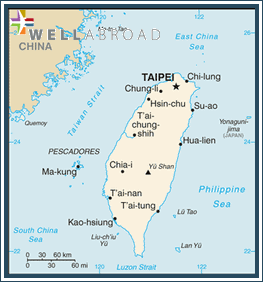|
MOST RECENT ALERTS
There's no recent alert.
|

|
|||||||||||||||
| COUNTRY OVERVIEW | ||||||||||||||||
|---|---|---|---|---|---|---|---|---|---|---|---|---|---|---|---|---|
|
| COUNTRY GENERAL INFORMATION | |||||||
|---|---|---|---|---|---|---|---|
| Language: |
Mandarin Chinese, Taiwanese, Hakka |
||||||
| Currency: | Taiwan Dollar (TWD) | ||||||
| Predominant Religions: |
Buddhist, Taoist, Confucianism, Christian |
||||||
| National Holidays: | |||||||
| Economic Status: |
Taiwan has developed steadily into a major international trading power with $466 billion in two-way trade (2007). Taiwan's accession to the World Trade Organization in 2002 has expanded its trade opportunities and further strengthened its standing in the global economy. Tremendous prosperity on the island has been accompanied by economic and social stability. |
||||||
| Security: | |||||||
| US Presence: |
American Institute in Taiwan
No. 100, Jinhu Road, Neihu District 11461, Taipei City, Taiwan Tel: (+886) (02) 2162-2000 Kaohsiung Branch Office
5F, No.88, Chenggong 2nd Road Qianzhen Dist.,Kaohsiung 80661 Taiwan Tel: (+886) (07) 335-5006 |
||||||
| Document Requirements: |
U.S. passport holders will be allowed to enter Taiwan without a visa for up to thirty days (no extensions allowed) if they have a passport valid for at least six months from the date of entry into Taiwan and have a confirmed return or onward air ticket. Travelers must have already met any additional visa requirements for the next destination, if applicable. If the passport is valid for less than six months from the date of entry into Taiwan, travelers may apply for a landing visa that has a duration of stay of no more than thirty days. The processing fee is NT $5123 (currently equivalent to approximately US $155.00; U.S. currency is not accepted), and no extensions are allowed. Travelers also have the additional option of applying for and receiving a Taiwan visa prior to arrival in Taiwan. The processing fee is US $131.00. |
||||||
| Major Airports: | |||||||
| Servicing Airlines: |
|
||||||
| Risks and Precautions: |
Although the overall violent crime rate in Taiwan is low, travelers should avoid high crime areas, such as areas where massage parlors, barbershops, and nightclubs operate as covers for prostitution activities and are often run by criminals. In contrast to these illegal fronts, ordinary barbershops and other legal service providers prominently display the usual services and the interiors can be seen through storefront windows. Illicit establishments generally do not advertize and casual passersby cannot view their interiors. Several U.S. citizens have been assaulted in these and other areas near bar and nightclub districts. Public transportation, including the buses and the subway, is generally safe in Taiwan, but women should exercise caution when traveling alone in taxis late at night. In several parts of Taiwan, incidents of purse snatching by thieves on motorcycles have been reported. Visitors should keep photocopies of their passport, other identification, and credit cards in a safe place. |
||||||
| Mortality Statistics: | |||||||
| Immunization Indicators: |
Required: None |
||||||
| Infectious Disease Concerns: |
Dengue, filariasis, Japanese encephalitis, leishmaniasis, and plague are diseases carried by insects that also occur in East Asia. Tickborne encephalitis occurs in forested regions in northeastern China and in South Korea. Protecting yourself against insect bites (see below) will help to prevent these diseases. Respiratory infections (origins often undefined) are common in travelers to East Asia. Measles remains endemic in the region, and infection has occurred in adopted children from China and in travelers to the region. Influenza may occur during all months of the year. Do not swim in fresh water (except in well-chlorinated swimming pools) in East Asian countries. Schistosomiasis (Schistosoma japonicum) is present in focal areas in China, especially in the Yangtze River basin. Leptospirosis is a risk, especially in tropical areas of China and South Korea. Rabies is widespread in China (not Hong Kong) and Mongolia. |
||||||
| Overall Quality of Medical Services: |
Health facilities in Taiwan are adequate for routine and emergency medical treatment. Physicians are well trained and many have studied in the U.S. and speak English. State of the art medical equipment is available at many clinics and hospitals. Hospitals’ nursing services provide medication dispensing and wound care, but generally not the daily patient maintenance functions found in U.S. hospitals. Taiwan regulations require ambulances to have emergency equipment and supplies and to be staffed by trained medical personnel (dial 119). For information on specific clinics and hospitals, please refer to the AIT web page at http://www.ait.org.tw/en/uscitizens/HealthCareInTW.asp |
||||||
| Providers in Network: |
|
||||||
| Recent Medical Threats/ Concerns/Warnings: |
Highly pathogenic avian influenza (H5N1) continues to cause outbreaks in domestic and wild bird populations and has caused human cases in several East Asian countries. Avoid all direct contact with birds, including domestic poultry (such as chickens and ducks) and wild birds, and avoid places such as poultry farms and bird markets where live birds are raised or kept. For a current list of countries reporting outbreaks of H5N1 among poultry and/or wild birds, view updates from the World Organization for Animal Health (OIE), and for total numbers of confirmed human cases of H5N1 virus by country see the World Health Organization (WHO) Avian Influenza website. |
||||||
| Communications Info: |
Country Calling Code: +866- |
||||||






